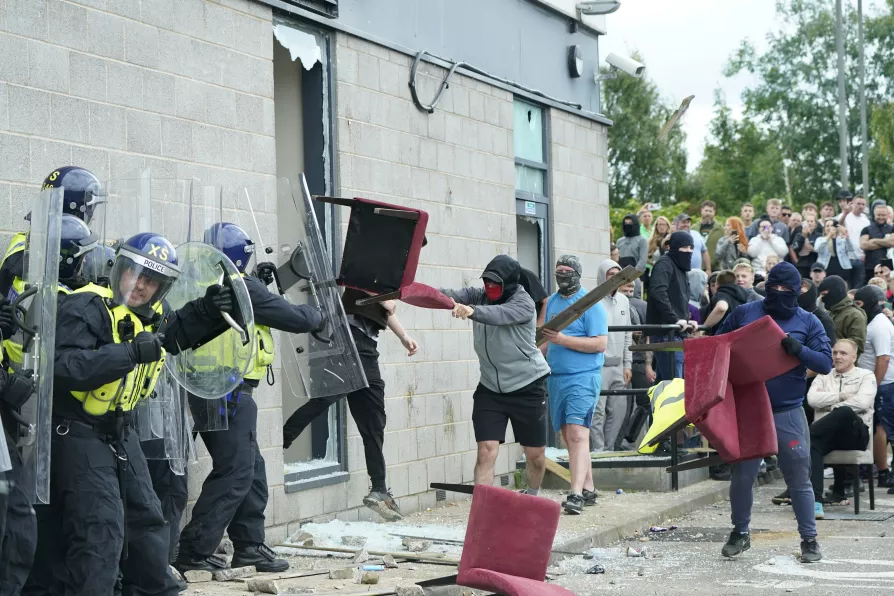
 A chair is thrown at police officers as trouble flares during an anti-immigration protest outside the Holiday Inn Express in Rotherham, South Yorkshire, August 4, 2024
A chair is thrown at police officers as trouble flares during an anti-immigration protest outside the Holiday Inn Express in Rotherham, South Yorkshire, August 4, 2024
LOOKING at how to combat the rapid spread of fascist rioting across Britain, we should not place much faith in calls for a tech-led crackdown focusing on stricter policing of the internet.
It is true that far-right agitators spread lies online, and these have played a role in whipping up the surge of race hate we have seen on Britain’s streets.
Nonsense about the Southport killer being Muslim or an asylum-seeker were promoted by the likes of Tommy Robinson and spread via online far-right networks. Higher up the food chain Reform UK proprietor Nigel Farage MP’s posts suggesting the local police were hiding something about the attack was likewise designed to provoke unrest.
Laws against incitement to violence and hate speech exist, and these should be upheld, with those doing so online treated as if they were doing so in any other public forum.
But it would be a mistake to view social media as the key problem. The reflex nature of the fascist attacks — immediately targeting two predetermined groups of people, refugees and Muslims — has continued since more information about the Southport suspect has been widely publicised, including that he is neither a refugee nor of Muslim heritage.
The Southport murders were an excuse for mobs of racists to go on the rampage, and though online lies about the perpetrator contributed, this clearly sizeable group of racists were ready to be roused.
The idea that their hate is “incubated” in online spaces is again not untrue, but far from the whole truth. It does not need to be nurtured by the propaganda of a far-right dark web when so much of what feeds it is promoted openly by government leaders and the mainstream media.
The same question of relative blame should apply when we see politicians try to pin the blame on foreign states.
An Establishment, “respectable” conspiracy theory tends to point to Putin’s Russia as the malign puppetmaster behind far-right unrest. An anti-establishment alternative gives Israel the role.
Both are misleading cop-outs. It’s true enough that both the Israeli and Russian governments have had links of various kinds to particular far-right activists or groups in the past in several countries, but this sort of opportunistic sponsorship, common among states, explains nothing about the growth of fascism here or anywhere else. Assuming it does ignores the home-grown character of the far-right menace and makes it harder to address.
Nothing attributable to RT or the Israeli embassy has done a fraction of the damage of the Conservative Party or the British media when it comes to whipping up hatred of Muslims and refugees.
Left MP Zarah Sultana, following rude treatment by presenter and former Labour MP Ed Balls as he tried to blame the riots on a failure to control immigration, illustrated the point by highlighting dozens of Daily Mail front pages scaremongering about immigrants. Rishi Sunak made “stopping the boats” and deporting refugees to Rwanda his signature policies.
Islamophobia has been promoted by governments and media since Tony Blair signed up to the “war on terror,” and revived by Tories and Labour recently to discredit the Palestine solidarity movement, which Robinson referenced in one of his incendiary posts.
Trusting corporations and the state to police disinformation online is a fool’s game. They are the biggest sources of disinformation around. The likeliest results will be further online censorship of the left and a rise in already high levels of distrust in all forms of authority, as we saw from the Covid deniers.
Pogroms — which are what we have seen attempted over the last week — are generated by race hate and long predate social media.
The fight against the far right is political. It must take place on the internet as well as in the street, in the workplace and elsewhere: but it won’t be won by technocratic means.














